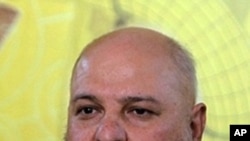Iranian oil exports fell dramatically during the past fiscal year, according to Iranian media reports, belying recent optimistic statements made by Iranian officials.
Iran's official Fars News Agency reports Sunday that the country's oil exports fell by more than 24 percent or close to $20 billion during the past fiscal year. But Iran remains OPEC's second largest oil producer behind Saudi Arabia.
Top Iranian officials, meanwhile, continue to paint a rosy picture of the country's oil and gas industry. Deputy Oil Minister Ali Reza Zeighami says Tehran is boosting domestic oil refining capacity to help Iranian consumers, during the next fiscal year.
The daily Resalat quotes Zeighami as saying that daily gasoline production would increase by 17 million liters by the end of the fiscal year. Iran has a chronic shortage of refining capacity.
Iranian Oil Minister Massoud Mir Kazemi also says Iran is increasing gasoline supplies and natural gas supplies for private vehicles:
He says that Iran is launching 10 new natural gas plants this year, in addition to increasing gasoline production to put more supplies on the market for drivers and to boost Iran's domestic production capacities.
Iranian officials have frequently made optimistic statements about oil and gas production despite increasing pressure from U.N. and U.S. economic sanctions.
Mehrdad Khonsari of the Center for Arab and Iranian Studies in London notes Iran's oil exports have been dropping consistently since the 1979 Iranian Revolution.
"Because of a lack of maintenance and lack of new technology - this has been part and parcel of Iran's petroleum industry in the last 30 years - the extraction of oil has been depleting and certain wells are producing less," said Khonsari. "So, while there have been efforts to increase oil production in certain areas, the overall production has been falling steadily for something like 300,000 barrels per day every year, according to most experts."
An Iranian-born analyst at the Middle East Institute in Washington, Alex Vatanka, says cronyism in the government of President Mahmoud Ahmadinejad is also contributing to Iran's energy production woes.
"We are seeing in the Iranian media former officials in the Iranian oil ministry openly saying under the administration of Ahmadinejad not a single strategic project in the energy sector has been launched," said Vatanka. "In reality, they say nothing is moving forward, despite grand statements from officials such as [Oil Minister Massoud] Mir Kazemi. One thing we are seeing more of now is the politicization of the bureaucracy that has traditionally dealt with the oil sector."
Vatanka says Ahmadinejad loyalists are often incompetent and face the additional pressure of the new sanctions.




